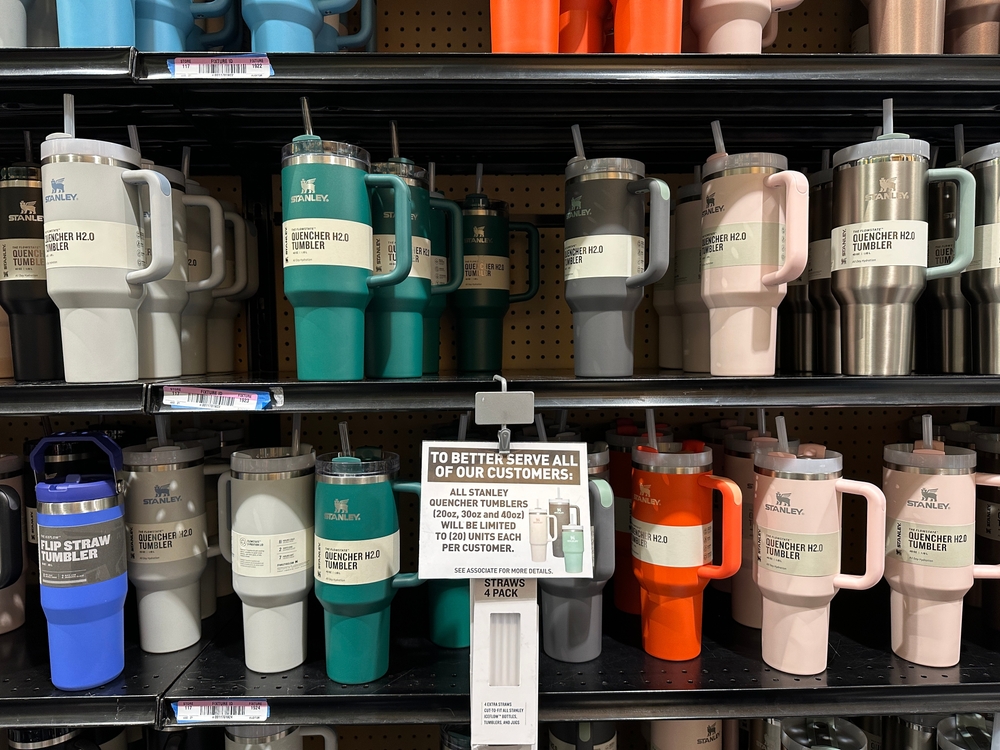The stainless steel water bottles known as Stanley cups, which became a nationwide obsession after going viral on social media, are under fire in several federal class action lawsuits for containing lead, which plaintiffs say the parent company, Seattle-based Pacific Market International, LLC (PMI), failed to disclose.
The cups have become a must-have accessory and status symbol for women and girls since they rose to TikTok fame in 2023, fetching exorbitant resale prices and prompting fans to wait in line for hours during a new release. Company revenue jumped from $73 million in 2019 to $750 million just four years later.
The Stanley brand is 111 years old and, according to Vox, was originally popular among blue-collar men and WWII pilots for its high-quality insulation and durability. The most popular products today are the 40-ounce “Quencher H2.0 FlowState” variety, which retails for $35-$50 and claims to keep hot drinks hot for seven hours, cold drinks cold for 11 hours, and iced drinks still iced two days later.
The five pending class actions in Washington, California, and North Carolina against PMI began with a single suit filed by four women in California state court on Feb. 1. The company appointed its defense counsel earlier this month.
The lawsuits allege that PMI marketed the cups as a safe part of a healthy lifestyle, despite the presence of lead. The women said they would not have purchased the cups had they known there was lead inside.
Mackenzie Brown, an attorney who purchased a Stanley cup after “being bombarded with advertising,” joined Meiling Robinson, Shea Ritchie, and Nora McCarl in claiming that “under the guise of encouraging young people to stay fit and hydrated,” [PMI] used “misleading advertising that has potentially exposed individuals and young children to a hazardous material.”
PMI kept customers in the dark so as not to interfere with its bonanza of influencer-driven sales, especially sales to young women.
The lawsuits maintain that the cups do not come with a Proposition 65 warning, despite PMI’s insistence that they do. Proposition 65, a California state law, requires that manufacturers disclose to consumers the presence of chemicals known to cause cancer, birth defects, or other reproductive problems.
PMI is also accused of selective advertising, emphasizing terms like “BPA free” and “recycled stainless steel” to appear fully transparent about all materials in the cups.
The company issued a statement on its website acknowledging the use of lead inside the vacuum insulation seal at the bottom of the cups. However, it added that “no lead is present on the surface of any Stanley product that comes into contact with the consumer nor the contents of the product.”
After a January 2024 influx of TikToks in which influencers tested their Stanley cups positive for lead with in-home testing kits, the plaintiffs alleged that PMI admitted on its website that the cups’ vacuum seals are “covered with a layer of steel, which … may come off ‘due to ordinary use’ and expose the seal containing the lead.” The lawsuits say that if the cups become worn or damaged over time, the vacuum seal could break and expose the user to lead.
Plaintiffs are seeking punitive and compensatory damages, along with a permanent injunction requiring PMI to clearly disclose the presence of lead in all products on packaging and at the point of sale. Their court-certified class actions would enable “hundreds of thousands” of others who purchased the cups to seek recourse against PMI.
Class action claims are filed when harm is done to a large group of people by the same defendant, all members of a class action lawsuit are treated as one plaintiff represented by a small handful of individuals. Plaintiffs can be scattered across a wide geographic area, often nationwide. The outcome of a class action applies to everyone in the case, and any settlement award is divided among them based on predetermined criteria. Given the staggering popularity of Stanley cups, class actions may lead to a more favorable outcome for plaintiffs in the cases to come.












